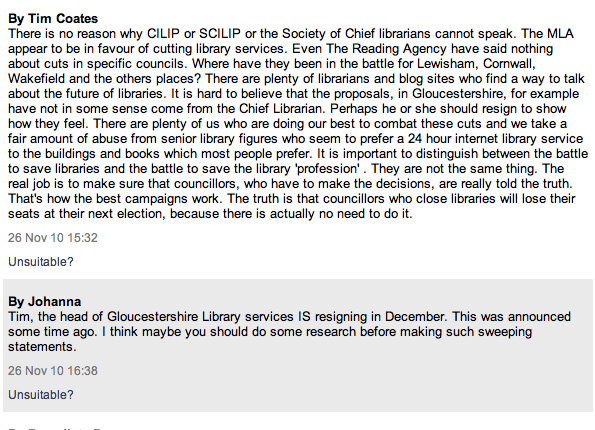Tribute and good luck to my friends in Lewisham today. They have organised a carnival to parade between the 5 libraries in the Borough that are threatened with closure. I am sorry I can't be with them, but I wish them sunshine and success. There will be many thousands walking in support of their endeavour.
In July the council announced that in order to make annual savings of the order of £300-£350,000 per annum they needed to close 5 of the 12 libraries in the borough. There is no need to close anything to achieve such a level of savings.
The "Library Budget Book" which is the detailed spreadsheet about how money is spent on a library service was obtained by residents in response to a Freedom of Information request. It is not obviously easy to understand, but detailed analysis of it shows:
The total cost of the library service in Lewisham in 2010- 2011 is planned to be £5,828,316. Of this £5,539,276 will come as funding from the council and it is anticipated that £289,040 will come in the form of fines, fees, charges and other income from library users.
On the face of it therefore to close 5 out of 12 libraries and only save £300-£350,000 requires explanation about how most of the money is spent. It is unlikely that 7 libraries cost £5.5m and 5 libraries cost £300,000. Within the expenditure there appears to be a large fixed cost that exists - irrespective of how many libraries are operating.
Analysis of the detail of the budget book sheet and comparison with similar figures in other councils lead to the following conclusions.
1. The sheet shows just one figure for "District Group general pay", which is £1,167,540. This covers the pay for 2 medium sized and 2 3 small libraries and also the area management costs for them, but it does not show the detail of each. The actual staff cost for the four five libraries is unlikely to exceed £600,000. Councillors need more detail, but the area management/central cost or overhead is likely to be £500k and that is not necessary for the operation of 4 5 libraries
2. Libraries Central Basic Pay, £945,410. This is the staff cost of Lewisham Central library. The library only receives 380,000 visits a year and this cost is far too high. There is certain to be a way to reorganise staff time and rotas that could make substantial savings without reducing any service.
3. Management Recharge and Directorate Recharge £385,100 and £879,376. This makes a total corporate overhead recharge of 1,264,476 out of a total cost of £5,539,276 which is almost 23%. Three years ago the average overhead recharge for London was 12.5% and this cost is at least double what it ought to be and councillors need an explanation of what these charges comprise.
4. Neighbourhood group general pay £724,190. This covers the pay for 6 small libraries and their area management but does not show the detail of each. The actual staff cost for the libraries is unlikely to exceed £500k, again councillors need more detail, but we know this to be approximately right because of the savings the council that the council have indicated they will make from the savings from their possible closures.
5.Service Development basic pay £275,240. This is another internal overhead cost within the service, most of which is not necessary for the management of 12 libraries.
6. Bibliographic service £125,190 This is not necessary at all as bibliographic services can now be obtained free from suppliers.
So in summary one would say that before proposing closures the council should have explored the possibility in detail of making the following savings- and possibly more
A . From items 1 and 4 - £500,000 from area management/non branch costs
B From item 2 £150,000 in reorganisational efficiency in the central library rotas
C From item 3 £600,000 from the combined central overhead recharges
D From item 5 £150,000 from central library staff costs
E From item 6 £100,000 from bibliographic services
This is a total of £1,500,000, savings from activities which will not affect the front line. line service to the public.
These are actions all to be taken inside the council, before it considers sharing activities with other councils, which, in their turn could produce, quite easily, a further £500,000
Having identified these savings, the recommended approach would be to use a portion of them to make improvements in stock, library interiors and opening hours, so that the whole programme is an improvement programme, rather than a programme of cuts.
Attempts have been made to draw the attention of councillors, officers, civil servants and all who could sensibly help with this discussion, without success
However it is not hard for anyone to draw just two clear conclusions
1. There is no need to close 5 libraries and that much greater savings are readily available
2. Unless councillors make sure that they are properly informed about the detail of expenditure they are likely to be led into wrong actions over closures.


